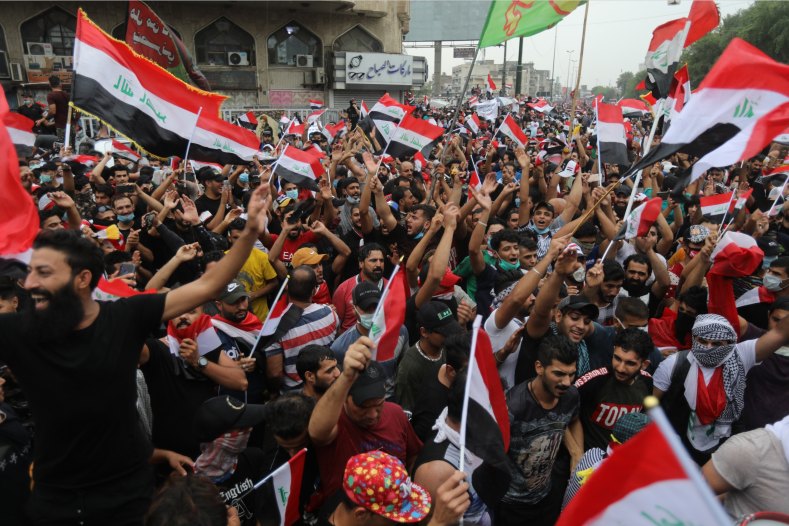Middle East response to protests main issue to watch in 2020
By Guy Burton | china.org | Updated: 2020-01-02 15:17

The final year of the decade has seen the continuation of the current conflicts as well as the reemergence of previous tensions in the Middle East. These issues are likely to persist into 2020 alongside other challenges, especially those coming from outside the region, including from the West and the Rest. But these may not be the most important developments to watch. Instead, it may well be the ability of protestors to pressure governments to make the changes that may eventually transform their politics, economies and societies.
Throughout 2019 the civil wars in Syria, Yemen and Libya have persisted. Elsewhere, the U.S. withdrew from the Joint Comprehensive Plan of Action (JCPOA) regarding Iran's nuclear program. It reimposed sanctions, hoping that it would put pressure on Tehran to accept a tougher agreement which would curb its regional activism.
Volatility was also present inside the countries across the region as well. 2019 started with Sudanese protestors challenging rising bread prices. By April, Sudan's army had removed President Omar al-Bashir. Meanwhile, demonstrations in Algeria brought about the end of the 20-year-long presidency of Abdelaziz Bouteflika. Later in the year, demonstrations against poor governance, corruption and the lack of economic opportunities brought people onto the streets in Lebanon and Iraq as well as temporarily in Iran.
Looking into 2020, the consequences of these developments may be felt in various ways. There may well be an escalation of the civil war in Libya, especially if Russian assistance to Khaled Haftar, leader of the rival eastern-based army, proves to be as substantive as recent media reports claim.
Moreover, the arguable decline of U.S. President Donald Trump has unwittingly followed the example of his predecessor, Barack Obama, in the drawing down of American influence in the region. Trump's failure to persuade others to marginalize Iran is one example. Another was his withdrawal of American troops from the Kurdish region in Syria, which not only meant the abandonment of an ally, but also ceded ground to the Turks and Russians.
Trump's fiery rhetoric as well as his unwillingness and inability to enforce what he says is likely to remain the case in 2020. The year will no doubt be dominated by the presidential election and whether Trump or the Democratic candidate wins, the U.S. influence will be relatively diminished in the region.
Limited American involvement will not be buttressed by a more proactive Western role elsewhere either. The new European Commission will be focused on internal challenges and reforms, including the management of more populist countries like Hungary and Poland as well as revising the Dublin Regulation which manages its refugee and asylum process. It will therefore be unwilling and unable to deal with the problems in the Middle East. Any involvement will likely be reactive – but even that will be limited, since it will have to make choices on its spending programs for its next budget now that Britain will be leaving the European Union.
Brexit will also have regional consequences for Britain, arguably one of the most active European states in the Middle East. A sluggish economy and falling public spending over the past decade have made it more reliant on foreign investment, including the purchase of prime real estate and luxury brands by Gulf monarchies' sovereign wealth funds.
For those countries which are currently experiencing unrest, challenges are still ahead in the new year. One of the features of these protests is the comparative learning which has taken place over the past decade. Although presidents and prime ministers – including those in Lebanon and Iraq – have been forced to resign, the protestors show little sign of leaving the streets. They have seen the consequences of doing so too early following the protests from earlier in the decade, in 2011.
Today, protestors maintain their vigil since they aren't satisfied to see the heads of governments removed. They want to see the regimes which maintained them similarly dismantled and new relationships built between governments and their societies. This is especially so as the old forms of patronage and "purchased" loyalty through the provision of public sector jobs and services become harder to achieve and therefore less sustainable.
If and how this change in the social contract is to be achieved may therefore be the story to watch for inside the Middle East over the coming year. In contrast to the role of external powers, it will be a less visible process, but one that if successful, may well have longer lasting consequences.
Guy Burton is a Visiting Fellow at the LSE Middle East Centre and an Adjunct Professor in International Relations at Vesalius College in Brussels.
























